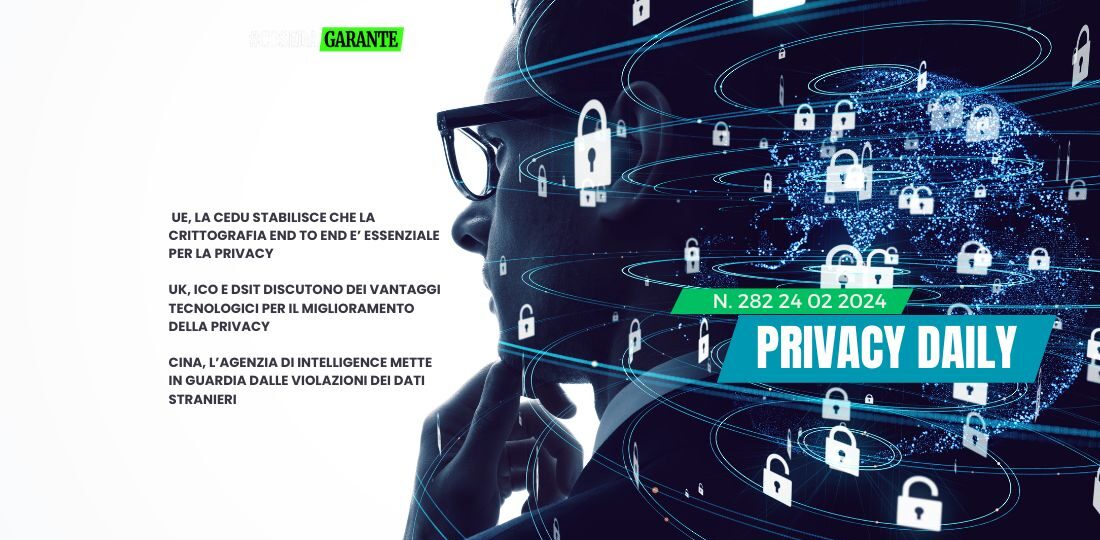VERSIONE ITALIANA
UE, LA CEDU STABILISCE CHE LA CRITTOGRAFIA END TO END E’ ESSENZIALE PER LA PRIVACY
La Corte europea dei diritti dell’uomo ha deciso in favore di Anton Podchasov, un cittadino russo, che nel 2018 ha contestato una legge del governo del suo paese che obbliga le aziende di telecomunicazioni a rendere accessibili i propri server per la raccolta di dati da parte delle forze dell’ordine. La Corte ha stabilito anche che la crittografia end-to-end è fondamentale per garantire il diritto alla privacy sopratutto nei sistemi di comunicazione digitale. Secondo la legge russa, le aziende di comunicazione devono conservare i dati di tutti gli utenti russi all’interno del Paese per sei mesi. Tuttavia, Telegram si è rifiutato di ottemperare all’ordine, sostenendo che era tecnicamente impossibile ed avrebbe indebolito la crittografia per tutti gli utenti. Podchasov ha sostenuto che la legge viola il diritto alla privacy delle comunicazioni degli utenti.
https://www.govinfosecurity.com/encryption-vital-for-right-to-privacy-european-court-rules-a-24365
UK, ICO E DSIT DISCUTONO DEI VANTAGGI TECNOLOGICI PER IL MIGLIORAMENTO DELLA PRIVACY
Le tecnologie di miglioramento della privacy – PET – consentono alle organizzazioni di utilizzare i dati sensibili in modo collaborativo, proteggendo la privacy e creando nuove opportunità per la ricerca e lo sviluppo. Molte organizzazioni però faticano, ancora oggi, a comprendere i benefici rispetto ai costi associati all’uso delle PET. Per questo motivo il DSIT e l’ICO hanno realizzato una collaborazione per sviluppare uno strumento che supporti le organizzazioni a valutare il rapporto costi/benefici di questa adozione. Questo blog rappresenta un primo passo in questa direzione, esplorando alcuni esempi di costi e benefici associati all’applicazione delle PET per consentire un apprendimento federato che protegge la privacy. Inoltre, vengono analizzati i risultati del premio PETs tra Regno Unito e Stati Uniti, che si sono concentrati sull’apprendimento federato salvaguardante la privacy (PPFL), una tecnologia che impedisce la ricostruzione di dati sensibili dagli aggiornamenti o dagli output del modello.
https://rtau.blog.gov.uk/2024/02/22/privacy-preserving-federated-learning-understanding-the-costs-and-benefits/
CINA, L’AGENZIA DI INTELLIGENCE METTE IN GUARDIA DALLE VIOLAZIONI DEI DATI STRANIERI
L’agenzia di intelligence cinese ha lanciato un allarme sullo spionaggio informatico straniero, affermando che i dati rubati mettono a rischio la sicurezza delle informazioni e delle reti del Paese. Il portavoce del Ministero della Sicurezza di Stato ha dichiarato che si presume che agenti stranieri abbiamo attaccato dipartimenti e aziende critiche in Cina, ottenendo costantemente dati sensibili. Questi hacker sfruttano le vulnerabilità delle unità cinesi a causa della mancanza di precauzioni di sicurezza e o della negligenza. In un caso specifico, un’azienda non ha aggiornato il suo software, consentendo agli hacker di rubare dati di produzione e informazioni sui clienti. Questa violazione ha causato danni allo sviluppo di attrezzature militari e minacciato la sicurezza del Paese. L’agenzia ha evidenziato anche come gli hacker prendano di mira le grandi imprese statali, evidenziando una situazione sospetta in cui i dati criptati sono stati inviati all’estero durante le prime ore del mattino a diversi indirizzi IP.
https://www.scmp.com/news/china/science/article/3252169/china-spy-agency-renews-foreign-cyber-intelligence-warning-after-data-breaches?campaign=3252169&module=perpetual_scroll_0&pgtype=article
VERSIONE INGLESE
EU, CEDU RULES THAT END-TO-END ENCRYPTION IS ESSENTIAL FOR PRIVACY
The European Court of Human Rights has ruled in favour of Anton Podchasov, a Russian citizen, who in 2018 challenged a law of his country’s government requiring telecommunications companies to make their servers accessible for data collection by law enforcement agencies. The court also ruled that end-to-end encryption is essential to guarantee the right to privacy, especially in digital communication systems. According to Russian law, communication companies must keep the data of all Russian users within the country for six months. However, Telegram refused to comply with the order, claiming that it was technically impossible and would weaken encryption for all users. Podchasov argued that the law violates users’ right to privacy in their communications.
https://www.govinfosecurity.com/encryption-vital-for-right-to-privacy-european-court-rules-a-24365
UK, ICO AND DSIT DISCUSS PRIVACY ENHANCING TECHNOLOGY BENEFITS
Privacy enhancing technologies – PETs – allow organisations to use sensitive data collaboratively, protecting privacy and creating new opportunities for research and development. However, many organisations still struggle to understand the benefits versus the costs associated with the use of PET. This is why the DSIT and the ICO have partnered to develop a tool to help organisations assess the cost/benefit ratio of this adoption. This blog is a first step in this direction, exploring some examples of the costs and benefits associated with the application of PETs to enable privacy-preserving federated learning. It also analyses the results of the UK-US PETs award, which focused on privacy-preserving federated learning (PPFL), a technology that prevents the reconstruction of sensitive data from model updates or outputs.
https://rtau.blog.gov.uk/2024/02/22/privacy-preserving-federated-learning-understanding-the-costs-and-benefits/
CHINA, INTELLIGENCE AGENCY WARNS OF FOREIGN DATA BREACHES
China’s intelligence agency has issued a warning about foreign cyber espionage, saying that stolen data puts the country’s information and network security at risk. The spokesman for the Ministry of State Security said that foreign agents are alleged to have attacked critical departments and companies in China, constantly obtaining sensitive data. These hackers exploit vulnerabilities in Chinese units due to a lack of security precautions and or negligence. In one specific case, a company failed to update its software, allowing hackers to steal production data and customer information. This breach caused damage to the development of military equipment and threatened the security of the country. The agency also highlighted how hackers target large state-owned enterprises, highlighting a suspicious situation where encrypted data was sent abroad during the early hours of the morning to several IP addresses.
https://www.scmp.com/news/china/science/article/3252169/china-spy-agency-renews-foreign-cyber-intelligence-warning-after-data-breaches?campaign=3252169&module=perpetual_scroll_0&pgtype=article



